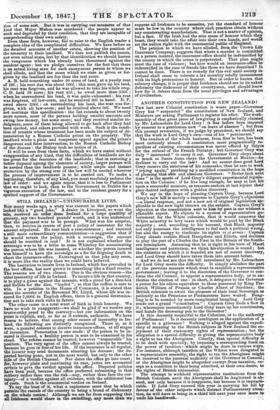STILL IRELAND !—UNINSURABLE LIVES.
Nov many weeks ago, a story was current in the papers which looked like a " good joke." A dealer in Liverpool, so went the tale, received an order from Ireland for a large quantity of grocery, say two hundred pounds' worth, and it was understood that the payment was to be prompt. What was his surprise, then, to receive in course of post a policy of insurance for the amount stipulated. He sent back a remonstrance ; and received a still more extraordinary communication—a suggestion that if he would return the policy, with a sovereign, the amount should be remitted in cask ! It is not explained whether the sovereign was to be a bribe to some Whiteboy for assassinating the person whose life was insured, or whether the person insured was himself to have the sovereign as a fee for feigning death to cheat the insurance-office. Extravagant as that joke may seem, it is more like the reality than we could have believed. The hesitation to insure lives in Ireland, which has prevailed in the best offices, has now grown to something like a fixed resolve. The reasons are of two classes. One is the obvious reason—the utter insecurity of life in Ireland. To insure a life in that country, is to play a game against the assassin, with a pistol for a dice-box and bullets for the dice, "loaded "; so that the ruffian is sure to win. In a petition to the House of Commons, it is stated that since the murder of the Reverend Mr. Lloyd, whose life was in- sured for 7,0001. in English offices, there is a general determina- tion not to take such risks in future.
The other cause is a total want of faith in Irish honesty. We have no wish to exaggerate—we shall be glad if we receive any trustworthy proof to the contrary—but our information on the point is explicit, and, so far as it extends, authentic. We have reason to believe, that among other causes of insecurity in Ire- land, the following are distinctly recognized. There is, as it were, a general consent to deceive insurance-offices, at all stages of insurance. Personation is one mode: if the person to be in- sured is diseased, a healthy person is sent to be examined in his stead. The referee cannot be trusted, however "respectable" his position. The very agent of the office cannot always be trusted, because he goes in fear of his life. If the insurance is all regular, the insurer may send documents attesting his decease; the de- parted having gone, not to the next world, but only to the other side of the British Channel. Nor dares the office go into court; for, however plain and convincing its case, juries are accounted Certain to give the verdict against the office. Disputed policies have been paid, because the office preferred submitting to that robbery rather than run the risk—nay, rather than face the cer- tainty—of a verdict against all evidence, with the additional loss of costs. Such is the commercial verdict on Ireland.
To say the least of it, what a supineness must that be which permits the rascals of the country to bring a brand of dishonesty on the whole nation 1 Although we are far from supposing that all Irishmen would share in the swindling, any more than we
suppose all Irishmen to be assassins, yet the standard of honour must be low in the country where such practices obtain without any counteracting manifestation. That is not a matter of opinion, but a fact. If the Irish had the nice sense of honour which they boast, they would take the affair into their own hands, and would set the nation right with the commercial public of England. The petition to which we have alluded, from the Crown Life Insurance Company, suggests that where a murder is committed on a person insured, the insurance-office should be indemnified by the county in which the crime is perpetrated. That plan might meet the case of violence; but how would an insurance-office be indemnified in the case of frauds like those we have described t It cannot be done. There is no remedy for this evil until society in Ireland shall cease to tolerate a lax morality totally inconsistent with its high pretensions to honour. But in order to hasten that salutary change, it is proper that Irishmen should see in its naked deformity the dishonour of their countrymen, and should know how far it debars them from the usual privileges and advantages of civilization.

























 Previous page
Previous page